Have you ever wondered which ingredients truly make a difference in achieving a brighter, even-toned complexion? Skin whitening is a quest for many, but finding the right ingredients can be a maze.
With years of research and expertise in skincare, we’ve curated a list based on science and proven results. Why trust us? Because we prioritize your skin’s health and beauty above all.
Here’s a glimpse of two potent players you’ll discover in the realm of skin lightening:
In this guide, delve deep into the science and benefits of each ingredient, equipping you with the knowledge to make informed skincare decisions.
Read on to discover the secrets of achieving a brighter, more even complexion through the power of science and nature.
1. Vitamin C
Vitamin C, scientifically known as ascorbic acid, is a water-soluble vitamin and powerful antioxidant. It’s renowned for defending the skin against environmental aggressors such as pollution and UV damage, promoting an even skin tone and youthful appearance. Vitamin C boosts skin defense and imparts a healthy, radiant glow.
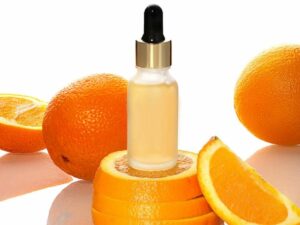
Benefits:
- Brightening and Evening Skin Tone: Vitamin C helps in diminishing the appearance of dark spots and hyperpigmentation, granting the skin a more even and radiant tone.
- Boosting Collagen Production: Essential for skin’s firmness and elasticity, Vitamin C stimulates collagen synthesis, supporting the skin’s structural integrity.
- Antioxidant Protection: Packed with antioxidant properties, Vitamin C safeguards the skin from damaging free radicals and environmental pollutants.
- Hydration Enhancement: By aiding in the skin’s ability to retain moisture, Vitamin C plays a role in ensuring that the skin remains hydrated and resilient.
Side effects:
- Potential for Flaking: Certain formulations with Vitamin C might lead to flaking of the skin, highlighting the importance of harmonizing its concentration and formulation to meet diverse skin requirements.
- Transient Flushing: On occasion, Vitamin C might cause a temporary flush or slight reddening of the skin after topical application.
Navigating the realms of Vitamin C in skincare unveils a treasure trove of benefits marked by brightening, protection, and revitalization, mapping a journey towards enhanced skin wellness.
2. Kojic Acid
Kojic Acid is derived from fungi and is prominently recognized for its exceptional ability to inhibit melanin production. Often used as an alternative to hydroquinone, it stands out in addressing hyperpigmentation, age spots, and other skin concerns related to uneven skin tone.
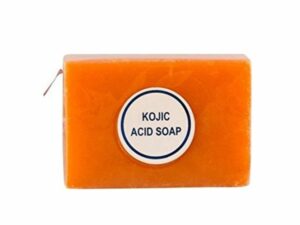
Benefits:
- Melanin Production Inhibition: As a primary function, Kojic Acid curbs melanin synthesis, directly targeting and reducing the visibility of dark spots and pigmentation.
- Antioxidant Properties: Beyond its melanin-reducing capability, Kojic Acid offers antioxidant protection, assisting in warding off damage from free radicals.
- Mild Exfoliation: Exfoliating properties within Kojic Acid support the removal of dead skin cells, paving the way for fresher, more radiant skin.
- Enhancement of Other Ingredients: When incorporated with other skincare ingredients, Kojic Acid’s efficacy can be magnified. Brands, Nako Cosmetic harnesses its potential by integrating it with synergistic components, optimizing skin benefit outcomes.
Side effects:
- Potential for Skin Sensitivity: Kojic Acid, depending on its concentration and usage, might result in skin sensitivity, emphasizing the significance of patch testing and formula compatibility.
- Possibility of Contact Dermatitis: In certain instances, Kojic Acid could lead to contact dermatitis, presenting symptoms like itchiness and swelling, underscoring the need for vigilance in its application.
Delving deeper into the attributes of Kojic Acid reveals its immense promise in addressing and correcting skin imperfections, establishing itself as a mainstay in modern skincare solutions.
3. Aloe Vera
Aloe Vera, sourced from the succulent plant species of the genus Aloe, is synonymous with soothing and healing. Rich in vitamins, enzymes, and amino acids, this age-old remedy has etched its mark as a go-to for an array of skin concerns.
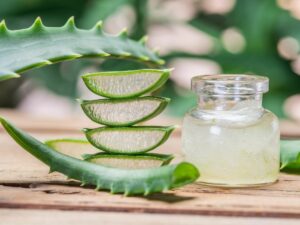
Benefits:
- Hydrating Efficacy: Aloe Vera provides a hydration boost to the skin, replenishing its moisture levels and ensuring a supple, fresh appearance.
- Anti-inflammatory Properties: Recognized for its calming nature, Aloe Vera can be instrumental in reducing redness and inflammation, offering relief to irritated skin.
- Wound Healing Capability: With its reparative elements, Aloe Vera aids in the acceleration of wound healing, benefiting skin that’s experienced minor cuts or burns.
- Protection Against Environmental Aggressors: A key ingredient in Nako Cosmetic’s offerings, Aloe Vera shields the skin from environmental stressors, maintaining its natural barrier and health.
Side effects:
- Allergic Reactions: While uncommon, some individuals might exhibit allergic reactions to Aloe Vera, which can encompass symptoms such as rashes or itchiness.
- Over-drying: Contrary to its hydrating reputation, in some formulations, Aloe Vera might lead to over-drying of the skin, stressing the importance of balance in skincare routines.
The embrace of Aloe Vera in skincare formulations, from its historic use to modern applications, is a testament to its multifaceted skin benefits.
4. Niacinamide
A derivative of vitamin B3, Niacinamide has ascended the ranks in skincare due to its versatility and compatibility with various skin types. Lauded for its capacity to address a wide array of skin concerns ranging from aging to acne, it has solidified its presence in many modern skincare formulas.
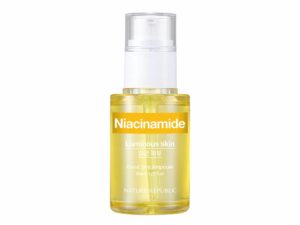
Benefits:
- Barrier Strengthening: Niacinamide fortifies the skin’s barrier, reducing the impact of environmental stressors and retaining moisture effectively.
- Regulation of Sebum Production: Effective in balancing oil production, it proves beneficial for both excessively dry and oily skin types, harmonizing the skin’s natural oil balance.
- Minimization of Pore Appearance: Enlarged pores can be a concern for many; Niacinamide aids in reducing their visibility, bestowing a smoother skin texture.
- Improvement in Skin Tone: Uneven skin tone can be a thing of the past with Niacinamide. For example, its consistent use can diminish the appearance of dark spots and redness, promoting an even complexion.
Side effects:
- Mild Burning Sensation: Certain individuals may experience a slight burning or tingling feeling upon applying products containing Niacinamide, especially in higher concentrations.
- Potential Breakouts: For some, Niacinamide might instigate initial breakouts or small bumps, often referred to as “purging”, as the skin adjusts to the ingredient.
Incorporating Niacinamide into your skincare routine can be transformative, supporting overall skin health and helping you achieve a radiant and rejuvenated look.
5. Alpha Arbutin
Alpha Arbutin is derived from the bearberry plant and has rapidly become a cornerstone in skincare regimens targeting hyperpigmentation. Its prowess in blocking the synthesis of melanin has made it a preferred choice for those aiming to achieve a brighter, more uniform complexion.
Benefits:
- Targeted Melanin Reduction: Alpha Arbutin intervenes in melanin production, significantly fading dark spots and reducing hyperpigmentation.
- Safe Skin Lightening: Unlike some skin lightening agents, Alpha Arbutin offers a safer approach, ensuring skin brightness without compromising its health.
- Antioxidant Activity: Alongside its lightening capabilities, Alpha Arbutin exhibits antioxidant properties that protect the skin from free radical damage.
- Enhanced Efficacy in Combinations: Often, the benefits of Alpha Arbutin are amplified when paired with other ingredients. For example, when coupled with Vitamin C, the synergistic effect can lead to enhanced skin brightening results.
Side effects:
- Increased Sun Sensitivity:Using products with Alpha Arbutin might enhance the skin’s susceptibility to UV damage, underscoring the importance of pairing with reliable sunscreen.
- Temporary Redness: For certain skin types, Alpha Arbutin may cause transient redness upon application, which usually subsides after some time.
Alpha Arbutin, with strong melanin-inhibiting properties, is a standout in skin-brightening. When used effectively, it ensures a radiant, evenly-toned complexion, showcasing skin vitality.
| Side Effect |
Description |
| Skin Irritation |
Alpha arbutin may cause skin irritation, including redness, itching, burning, or stinging sensations, especially when used in high concentrations or on sensitive skin. |
| Allergic Reactions |
Some individuals may experience allergic reactions to alpha arbutin, leading to hives, rashes, or swelling of the skin. |
| Dryness and Peeling |
Alpha arbutin can sometimes result in dryness and peeling of the skin, particularly when used in conjunction with other skin-lightening agents. |
| Photosensitivity |
There is a risk of increased sensitivity to sunlight (photosensitivity) when using alpha arbutin, which can lead to sunburn if adequate sun protection is not applied. |
| Uneven Skin Tone |
In rare cases, alpha arbutin may lead to uneven skin tone or hyperpigmentation if not used correctly or if it interacts with other skincare ingredients. |
| Skin Barrier Disruption |
Prolonged or excessive use of alpha arbutin may compromise the skin’s natural barrier, making it more susceptible to external irritants and infections. |
| Temporary Whitening Rebound |
Some users may experience a “whitening rebound” effect where the skin darkens after discontinuing alpha arbutin use, although this effect is not well-documented. |
| Eye Irritation (Avoid Eyes) |
Alpha arbutin should be kept away from the eyes, as it can cause irritation and discomfort if it comes into contact with the ocular area. |
6. Glycolic Acid
An alpha hydroxy acid (AHA) naturally derived from sugar cane, Glycolic Acid stands as a titan in the domain of chemical exfoliation. It penetrates the skin efficiently due to its small molecular size, making it a top choice for skincare aficionados looking to rejuvenate their skin’s surface.
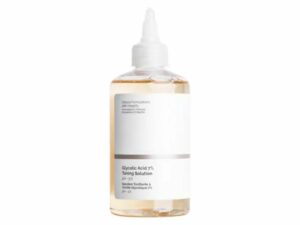
Benefits:
- Effective Exfoliation: Glycolic Acid proficiently sloughs off dead skin cells, revealing a brighter, more radiant complexion beneath.
- Stimulation of Collagen Production: As it delves deeper into the skin, Glycolic Acid promotes collagen synthesis, which is pivotal for maintaining skin’s elasticity and firmness.
- Reduction in Fine Lines and Wrinkles: By accelerating cell turnover, it assists in diminishing the appearance of fine lines and wrinkles, granting a smoother skin texture.
- Enhanced Product Absorption: With the removal of the upper layer of dead cells, the skin becomes more receptive, allowing for better absorption of other skincare products.
Side effects:
- Photosensitivity: Post-application of Glycolic Acid, the skin might become more susceptible to sunburn, underlining the importance of diligent sunscreen application.
- Mild Irritation: For those with sensitive skin or those new to AHAs, there could be instances of tingling or slight burning sensations after using products containing Glycolic Acid.
Glycolic Acid into your skincare routine can be a game-changer, helping you achieve smoother, more youthful-looking skin and revealing your inner radiance.
7. Azelaic Acid
Azelaic Acid is a naturally occurring acid found in grains like wheat, rye, and barley. Esteemed for its anti-inflammatory and anti-bacterial properties, it has found its rightful place in skincare routines aiming at tackling issues such as acne and rosacea.
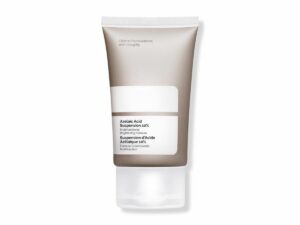
Benefits:
- Effective Against Acne: With its antibacterial prowess, Azelaic Acid targets acne-causing bacteria, helping in reducing breakouts and managing acne-prone skin.
- Soothing Rosacea Symptoms: Known to minimize inflammation, it is instrumental in soothing and managing the symptoms of rosacea, offering comfort to distressed skin.
- Hyperpigmentation Management: Azelaic Acid is conducive to fading dark spots and hyperpigmentation, promoting an even skin tone and complexion.
- Refinement of Skin Texture: By unclogging pores and renewing skin cells, it contributes to a smoother, refined skin texture, enhancing skin clarity and vibrance.
Navigating Azelaic Acid into your skincare routine can be a reassuring step towards achieving clear, calm, and even-toned skin, especially if you’re dealing with acne or rosacea.
Side effects:
- Skin Dryness: Some might experience a sense of dryness or flakiness as the skin adjusts to Azelaic Acid, highlighting the necessity for appropriate moisturization.
- Transient Itching or Tingling: An initial application can sometimes be accompanied by a temporary sensation of itching or tingling, which often diminishes with continued use.
8. Hydroquinone
Hydroquinone’s proficiency lies in its ability to reduce the appearance of dark spots, melasma, and other forms of hyperpigmentation. By inhibiting the activity of tyrosinase, an enzyme involved in melanin production, it strives to unveil a brighter, more even-toned complexion.
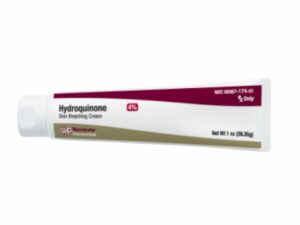
Benefits:
- Potent Pigmentation Reducer: Hydroquinone works diligently to fade dark spots and melasma, facilitating a more uniform skin tone.
- Melanin Synthesis Inhibition: Acting at the cellular level, it obstructs the pathways involved in melanin production, targeting hyperpigmentation at its root.
- Enhancement of Other Treatments: Often used in conjunction with other skincare ingredients, Hydroquinone can bolster the effectiveness of various treatments aimed at skin lightening.
- Gradual Skin Lightening: Continuous application leads to gradual lightening of the skin, making pigmented areas less discernible over time.
Side effects:
- Skin Sensitivity: Usage of Hydroquinone may render the skin more sensitive, necessitating caution to prevent undue reactions.
- Risk of Ochronosis: Rarely, the prolonged use of Hydroquinone may result in ochronosis, a condition characterized by the darkening of the area where the product is applied.
Hydroquinone into your skincare regimen can be a powerful step towards achieving a more even and radiant complexion, particularly if you’re dealing with stubborn dark spots or melasma.
9. Glutathione
Glutathione has gained acclaim in skincare circles for its skin brightening capabilities. Its dual action defending the skin against oxidative stress while concurrently reducing melanin production makes it a revered component in skincare products aiming for luminosity.
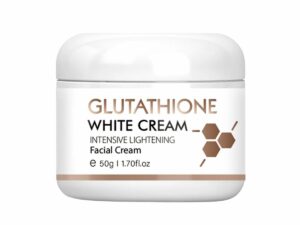
Benefits:
- Oxidative Stress Shield: Glutathione neutralizes harmful free radicals, thus safeguarding the skin from the detriments of oxidative stress and potential premature aging.
- Melanin Regulation: By affecting the metabolic pathway of melanin, Glutathione assists in diminishing hyperpigmentation, paving the way for a brighter complexion.
- Skin Detoxification: Its inherent antioxidant properties play a crucial role in detoxifying the skin, keeping it vibrant and healthy.
- Boosted Skin Health: Beyond mere lightening, Glutathione promotes overall skin health, enhancing its texture, elasticity, and hydration levels.
Side effects:
- Digestive Issues: When taken as a supplement, some individuals might experience abdominal discomfort or other digestive disturbances.
- Hormonal Imbalances: There have been isolated reports linking excessive intake or injection of Glutathione to potential hormonal imbalances, necessitating circumspection in its prolonged use.
Embracing Glutathione in your skincare regimen can be a delightful journey towards achieving a brighter, healthier, and more radiant complexion, reminiscent of youthful vitality.
10. Mulberry Extract
Mulberry Extract has long been celebrated for its skin-enhancing properties. Rich in antioxidants and compounds known to inhibit melanin production, this natural ingredient has steadily found its niche in formulations targeting skin radiance and evenness.
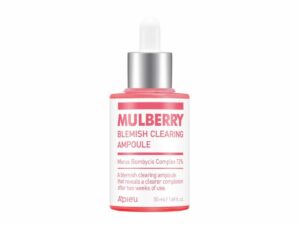
Benefits:
- Melanin Inhibition: Mulberry Extract contains components that deter tyrosinase, an enzyme vital for melanin synthesis, helping in the reduction of dark spots and hyperpigmentation.
- Antioxidant Richness: Loaded with flavonoids and vitamins, Mulberry Extract combats free radicals, thus shielding the skin from oxidative stress and environmental aggressors.
- Anti-Aging Potential: The extract’s ability to boost collagen synthesis aids in skin firmness and reduces the appearance of fine lines.
- Skin Soothing: With its anti-inflammatory properties, Mulberry Extract provides a calming effect, alleviating skin redness.
Side effects:
- Slight Allergenic Response: In certain individuals, Mulberry Extract might trigger an allergic skin response, resulting in itchiness or mild rash.
- Photosensitivity: There’s a possibility that Mulberry Extract might make the skin more susceptible to sun damage, emphasizing the importance of sun protection when using products containing the extract.
Incorporating Mulberry Extract into your skincare regimen can be a delightful journey towards achieving a brighter, more even complexion, all while basking in the protective embrace of its antioxidant-rich properties.
Dive Deeper Into Our Resources
Looking for more diverse product options? Browse through our handpicked selections:
Still haven’t found what you’re looking for? Don’t hesitate to contact us. We’re available around the clock to assist you.
Conclusion
Navigating the maze of skin-whitening ingredients can often be overwhelming, but armed with this comprehensive guide, the journey becomes straightforward and enlightening. This curated list not only empowers with knowledge but ensures informed choices that align with skin aspirations.
For those seeking premium skincare solutions, Nako Cosmetic remains a beacon of excellence. Trust in their expertise for products that resonate with genuine care. For bespoke skincare advice, contact us today.








